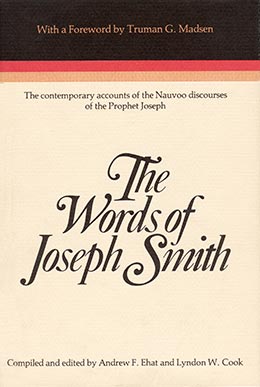30 March 1842 (Wednesday). Upper Room, Red Brick Store
Nauvoo Relief Society Minutes[1]
Pres. Joseph Smith arose—spoke of the organization of the society. Said he was deeply interested that it might be built up to the Most High in an acceptable manner—that its rules must be observed—that none should be received into the society but those who were worthy. Proposed that the society go into a close examination of every candidate—that they were going too fast—that the society should grow up by degrees; should commence with a few individuals—thus have a select society of the virtuous, and those who will walk circumspectly. Commended them for their zeal but said some times their zeal was not according to knowledge. One principal object of the institution was to purge out iniquity—said they must be extremely careful in all their examinations or the consequences would be serious. Said all difficulties which might and would cross our way must be surmounted, though the soul be tried, the heart faint, and hands hang down—must not retrace our steps. That there must be decision of character aside from sympathy. That when instructed we must obey that voice, observe the constitution, [2] that the blessings of heaven may rest down upon us. All must act in concert or nothing can be done, that the society should move according to the ancient Priesthood, hence there should be a select society, separate from all the evils of the world, choice, virtuous and holy. [3] Said he was going to make of this society a kingdom of priests as in Enoch's day—as in Paul's day—that it is the privilege of each member to live long and enjoy health. [4] Pres. Smith proposed that the brethren withdraw that the society might proceed to business—that those wishing to join might have their names presented at the next meeting.
—30 March 1842
Notes
[1] See History of the Church, 4:570, and Teachings, pp. 201-2. The source for the entries in History of the Church and Teachings is the Nauvoo Relief Society Minutes, kept by Eliza R. Snow.
[2] See 17 March 1842, note 4.
[3] According to Joseph Smith, unanimity of feeling and purpose and the entering of covenants of righteousness and virtue were aspects of the ancient order of the priesthood. See next note and History of the Church, 5:1–2 (or Teachings, p. 137).
[4] In preparing this discourse for publication, the original compilers changed the word society (see 17 March 1842, note 2) to Church (Joseph Smith Papers, Box 4 folder 4, Church Archives). This change obscured the important fact that these minutes demonstrate that at least a month before he gave endowment ordinances in their fullness for the first time (4 May 1842), Joseph Smith intended that women would receive ordinances promising them that they would be queens and priestesses in eternity. Moreover, Joseph Smith conveyed the impression that husbands and wives would receive the fullness of the priesthood blessings, through which they would be promised life as long as it would be desirable to them (see 5 October 1840, note 13). That the conferral of these ordinances would not be a conferral of priesthood is expressed best by Elder James E. Talmage in this classic and ever-timely statement:
In the restored Church of Jesus Christ, the Holy Priesthood is conferred, as an individual bestowal, upon men only, and this in accordance with Divine requirement. It is not given to woman to exercise the authority of the Priesthood independently; nevertheless, in the sacred endowments associated with the ordinances pertaining to the House of the Lord, woman shares with man the blessings of the Priesthood. When the frailities and imperfections of mortality are left behind, in the glorified state of the blessed hereafter, husband and wife will administer in their respective stations, seeing and understanding alike, and co-operating to the full in the government of their family kingdom. Then shall woman be recompensed in rich measure for all the injustice that womanhood has endured in mortality. Then shall woman reign by Divine right, a queen in the resplendent realm of her glorified state, even as exalted man shall stand, priest and king unto the Most High God. Mortal eye cannot see nor mind comprehend the beauty, glory, and majesty of a righteous woman made perfect in the celestial kingdom of God (James E. Talmage, "The Eternity of Sex," Young Woman's Journal 25 [October 1914]: 602-3).
